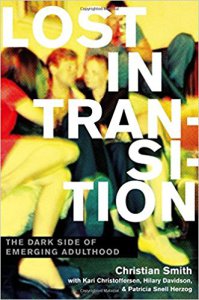
Though most of us in collegiate ministry have heard the term emerging adulthood, not everyone has considered the social cost of delaying adulthood. In Lost in Transition: The Dark Side of Emerging Adulthood, Dr. Christian Smith uses sociological evidence conducted through surveys and interviews to show us the dark side. And it is dark. Centered around five chapters, the book provides an inside view of the attitudes, thoughts, and actions of emerging adults aged 18-23, roughly the tradition college age.
Emerging adulthood, a term coined first by psychologist Jeffery Arnett, describes a social transition which occurred after World War II. First, due to the GI Bill and more emphasis on education, more students were able to go to college rather than go straight into a job. Secondly, from 1950 to 2006 the median age of first marriage for women rose from 22.8 to 25.9 years. Thirdly, due to global pressure, economic stability changed causing many young adults to not be able to enter into long-term careers right out of high school or college. Fourthly, due to the factors listed so far, many parents made choices to continue to support their children well into their twenties and even early thirties as they attempt to have stable, adult lives. Fifthly, the wide-spread use of birth control made it easy for young adults to have sexual relations apart from marriage and procreation. Finally, according to Dr. Smith, during the 1980s and 1990s American collegiate culture began to promote poststructuralism and postmodernism which eventually moved into the mainstream of the culture where it morphed into individualistic subjectivism and moral relativism.
While emerging adulthood has allowed more access to education, travel, and experimentation in careers, it has also come with a price. According to Dr. Smith there are five major problems which are taking a toll on these young adults. The changing social conditions have led to problems that Dr. Smith documents in chapters entitled: Morally Adrift; Captive to Consumerism; Intoxication’s “Fake Feeling of Happiness”; The Shadow Side of Sexual Liberation; and Civic and Political Disengagement.
While I cannot go into detail about every chapter, I will give some highlights on the major points of each one.
Morally Adrift
- Sixty percent of emerging adults express a highly individualistic approach to morality. For them morality is a personal choice, entirely a matter of individual decision.
- Thirty percent expressed a belief in strong moral relativism.
- Thirty-four percent expressed not knowing what makes something morally right or wrong.
Captive to Consumerism
- Most emerging adults are perfectly happy with mass consumerism.
- Those who do question the patterns of always buy more and more stuff often see it as a problem of other people.
- Many emerging adults have come to see college as just another “product” to buy bought and consumed in order to make more money.
- Most have embraced a notion of the “good life” in financial terms.
Intoxication’s “Fake Feeling of Happiness”
- Of the 78 percent of EA who drink alcohol, 60 percent reported binge drinking at least once in the previous two weeks.
- Twelve percent of EA surveyed reported smoking marijuana either once a week, a few times a week, daily, or more often.
- There is a sharp rise in those who drink and use drugs from the 13 to 23 demographics.
- Twenty-two percent were called “partiers” by Dr. Smith’s research group. These are EA who drink regularly, and often binge drink.
- Four percent of those 23 or younger were already recovered addicts.
The Shadow Side of Sexual Liberation
- The typical never-married American EA has had an average (median) of 3 sexual intercourse partners. In short, the vast majority of never-married EA ages 18-23 have been physically intimate with at least one other person. The typical one started at age 16. And half of the sexually initiated have had a good deal of sexual experience with more than one or two partners.
- Smith concludes the chapter thus: “not far beneath the surface appearance of happy, liberated emerging adult sexual adventure and pleasure lies a world of hurt, insecurity, confusion, inequality, shame, and regret.
Civic and Political Disengagement
- The largest group (27%) of EA were apathetic to politics. The genuinely political were the smallest group (4%).
- Smith sees most of the “Obama bump” from emerging adults to have worn off. He sees no evidence that the current cohort of emerging adults (snapshot in 2011) will be more involved than Millennials or Gen X.
- Smith attributes this lack of involvement due to several factors: mass consumerism; moral confusion and disorientation; individualistic relativism; and technological submersion in interpersonal relationships in private settings.
This book is worth a read even if it is almost seven years old now. If you would like to know more about emerging adulthood, read my review of two other books on the topic.
For more on the topic of civic virture and its decline, read my review of Ben Sasse’s book The Vanishing American Adult.
Advertisements Share this:





